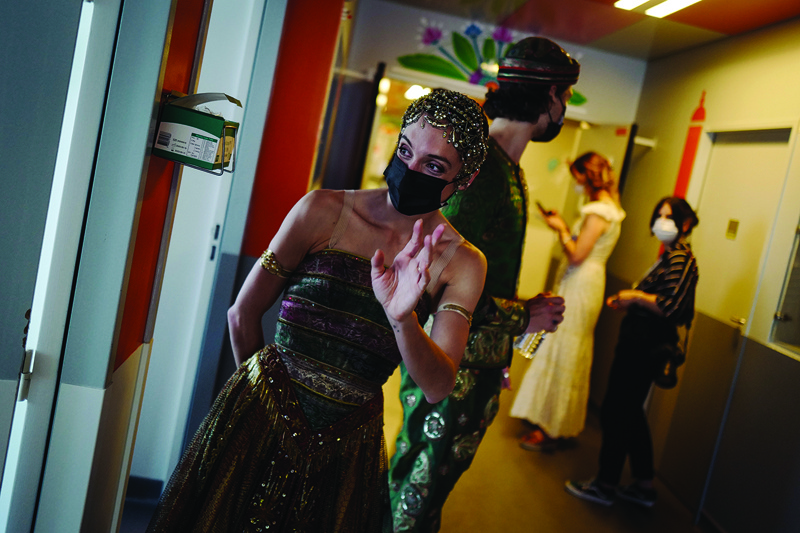 PARIS: French ballet dancer of the Paris Opera Ballet Dorothee Gilbert says goodbye to a child after dancing for him at the intensive care child unit of the Hospital Necker-Enfants Malades AP-HP in Paris. — AFP
PARIS: French ballet dancer of the Paris Opera Ballet Dorothee Gilbert says goodbye to a child after dancing for him at the intensive care child unit of the Hospital Necker-Enfants Malades AP-HP in Paris. — AFP
In an intensive care unit, an intubated boy is watching intensely as two star dancers from the Paris Opera twirl before him in shimmering costumes. "We're going to do a promenade, an arabesque, a porte poisson," says dancer Hugo Marchand as he pulls off some elaborate moves with his partner Dorothee Gilbert around the bed and beeping machines. "We just came to say a little hello," he says as they depart, and the child gives a small wave of acknowledgement.
The dancers move from room to room, dressed in the green and gold costumes of the "La Bayadere" ballet-with added surgical masks-joking with caregivers and getting some bemused expressions from the patients. In one room, it's a baby watching them, eyes wide as Gilbert's pirouette sets her dress fluttering.
They are in the Necker-Enfant Malades Hospital as part of the "What Dance Can Do Project" organised by a Swiss-French association, which aims to empower children though dance, especially those affected by poverty, exile or illness. Its field of operations never stops growing, from an orphanage in Morocco to a dance school in New Zealand to hospitals in Paris and Zurich. "We see how it lifts them out of their complicated daily lives," said Marchand, adding that he likes the opportunity to "feel useful".
"The thing that moves me the most is managing to bring them a bit of lightness. I always hope these children go to sleep that night dreaming of dance." "In their looks, we see little sparks, curiosity, maybe some admiration, or maybe just 'What on earth are these people up to?'" laughs Gilbert.
'UN of Dance'
In her bed, 15-year-old Maely smiles as she watches Marchand jumping across the corridor. "We are like giant frogs," he tells her. "There's no talking in ballet?" the young girl asks. So the dancers show her some pantomime. "I'm the swan queen," says Gilbert, making a crown above her head with her hands. "We see the positive effect on some of the patients," says Fabrice Lesage, head of the intensive care unit. "We see them smile when they no longer smiled before. It gives them energy to get better."
Aurelia Sellier, who founded the association in 2018, says she was inspired by choreographer Theo Ndindwa who took dance classes into a township in South Africa and argued for dance as a force for social change. It works with some 30 volunteers and already has connections in places like Tunisia and Kenya, where children "are very aware of being excluded from the rest of society and can find affirmation in the posture of dance," Sellier tells AFP. "Our goal in five or 10 years is to have an international federation with local associations... a sort of United Nations of Dance!" - AFP

